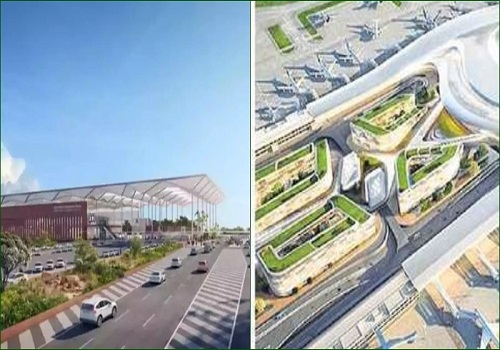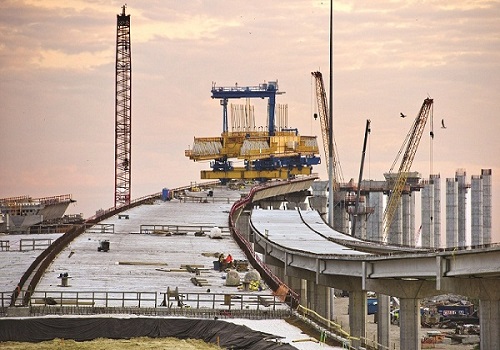2024 Union Budget: Infrastructure, sustainability, housing & retail participation to boost real estate

Follow us Now on Telegram ! Get daily 10 - 12 important updates on Business, Finance and Investment. Join our Telegram Channel
As anticipation for India's 2024 budget builds, real estate sector is eagerly awaiting policy measures that could shape the industry's trajectory in the coming fiscal year and beyond. The Indian real estate market displayed exceptional resilience during 2023 across all asset classes, as optimism prevailed in domestic markets. Office and residential sector witnessed stronger than expected growth, while institutional investments remained sturdy asserting positive business sentiments. Stable interest rates, moderated inflation levels and positive growth of high-frequency economic indicators further supported growth in demand across real estate verticals.
As with typical election years in recent times, an interim budget will be presented in February 2024, followed by a detailed one post-elections. Although the interim budget in February will primarily be an account of government income and expenditure, experts believe specific measures will go a long way in shaping the economic growth trajectory across sectors. The Union Budget for the fiscal 2024-25can build upon the strong foundation set by earlier budgetary announcements and create a blueprint for targeted economic stimulus led by progressive reforms. At a time when the real estate landscape has been navigating through successive defining moments, the upcoming budget has the potential to act as a catalyst for the sector's sustained long-term growth. Expectations for India's 2024-25 budget in the real estate sector are multifaceted, encompassing affordability, liquidity, taxation reforms, sustainability, infrastructure development, and technological advancements.
“The real estate community looks at the upcoming budget with optimism, seeking a strategic roadmap that aligns well with evolving needs of stakeholders including end-users’ developers & investors. Housing, infrastructure development, sustainability and digitization will remain at the core of the budget, which will go a long way in supporting real estate growth across segments in long term. EV infrastructure, renewable energy and green financing will continue to remain in focus creating a strong base for a sustainable future. Incentivisation of green buildings through minimum alternate tax or tax breaks similar to infrastructure sector will be particularly beneficial. Meanwhile, retail investors are calling for additional rationalising of the capital gains tax structure. The Union Budget 2024-25 should explore initiatives to boost greater retail engagement in REITs and InvITs. Moreover, alterations to personal tax slabs have the potential to fuel consumption across various sectors, including real estate assets and allied sectors.” said Badal Yagnik, Chief Executive Officer, Colliers India.
'Housing at the focus of budgetary announcements:
Demand side: Increasing the deduction limit for interest repayment on home loans can lead to higher disposable income in the hands of affordability of homebuyers especially for the EMI dependent ones. The existing limits of principal repayment of housing loans under section 80C can be raised further providing a boost to sales of housing units. Key expectations include the following:
* Separate & higher deduction for housing loan principal repayment, currently capped at INR 150,000 under section 80C.
* Limit on tax deduction on interest paid should be increased from the current INR 2 lakhs to about INR 3-4 lakhs in case of self-occupied property. In case of let-out property, limits can be dropped entirely.
* Interest exemptions under 80EEA and 80EE (applicable for first-time homebuyers in affordable housing) can be increased from current capping of INR 150,000 and 50,000 respectively.
* Reintroduction of tax exemptions for first-time homebuyers especially in the affordable segment.
* Standardisation and rationalisation in “Affordable Housing” definition across government schemes and financial institutions can help homebuyers qualify for cheaper financing options in the particular category.
Supply side: The real estate sector often grapples with complex tax structures, impacting both developers and homebuyers. Expectations include a re-evaluation of the Goods and Services Tax (GST) rates on under-construction properties and raw materials to improve affordability.
With the government's ambitious "Housing for All" initiative at its final leg, there is a widespread hope for targeted incentives and subsidies to boost affordable housing projects. Potential measures could include tax breaks for developers focused on affordable housing, thereby encouraging increased supply to meet the rising demand in urban and rural areas. Furthermore, increased annual allocation for PMAY schemes, always prove to spurt demand in the affordable housing segment. Key expectations include the following:
* GST reduction on key raw materials such as cement, steel and aluminium will help in controlling project costs.
* 100% tax holiday for affordable housing projects under Section 80IBA to be re-introduced.
* Increased fund allotment through SWAMIH fund for improving liquidity in stressed residential projects.
‘Infrastructure’ status and higher spend to support real estate growth:
Infrastructure development will continue to remain the key focus in the upcoming budget, with continued fund allocation towards the sector. However, granting ‘infrastructure’ status to the sector remains a long pending industry demand which will ensure easier access to institutional credit and help reduce developer’s cost of borrowing.
At the same time, the budget needs to assess the progress of crucial infrastructure projects and continue laying strong foundations in the form of multimodal logistic parks, industrial corridors, ports, inland waterways, expressways and suburban railway systems through increased budgetary allocations and encouraging private participation. Additionally, there is a concerted demand for fast-tracking development of smart cities and intra-city infrastructure which will ultimately provide a supportive business environment to multinational companies including GCCs in Tier II locations of the country. Thus, key expectations include the following:
* Granting “Infrastructure status” to the real estate sector.
* Incentivising corporate tax structure for GCCs operating in India.
* GST reduction on transportation services to reduce the overall logistics cost.
Increased focus on sustainability and EV adoption:
Sustainability and green initiatives are gaining prominence globally, and the real estate sector in India is no exception. Incentivising investment in green bonds and renewable energy business would help India achieve net zero emission targets by 2070 and meet 50 percent of energy requirements from renewable energy sources by 2030. Extension of benefits under the Faster Adoption and Manufacturing of Hybrid and Electric Vehicles (FAME) scheme will be pivotal in promoting sustainable growth by providing subsidies for the purchase of EVs, alongside mandating EVs in public transport, logistics, and delivery sectors. Key expectations include the following:
* Tax incentives for developers to obtain green certifications.
* Subsidies for electric vehicles (EVs) to get extended under FAME scheme and shall also include light to heavy commercial vehicles in the scheme.
* Introduction of production linked incentives specific to companies associated with EV charging stations and battery manufacturing.
* Viability gap funding to companies especially startups in battery swapping and battery on- demand technologies.
Manufacturing push to remain competitive:
Manufacturing is one of the high priority sectors, considering its influence on the India’s growth trajectory. At present, the corporate concessional tax rate is extended for the domestic manufacturing companies incorporated on or before 31st March 2024 to promote new manufacturing startups. Key expectations include the following:
* Extension of concessional corporate tax rate of 15% for new segments within the overall ambit of manufacturing, transport and logistics and non-corporate taxpayers like LLPs and trusts as well
* Increased allocation of funds towards upskilling and vocational training in manufacturing sector including MSMEs
* Rationalisation of import-export tariffs and expediting India’s integration into global supply chains
Rationalisation of tax slabs and rates for individuals:
Taxpayers continue to hope for tax incentives from the government. Expectations include measures aimed at easing the tax burden on individuals, possibly through revised income tax slabs, increased deduction limits, or other progressive reforms. Further, owing to the rising healthcare costs, individuals can benefit from higher deduction limits on healthcare insurance and policies under section 80D. Moreover, simplification of capital gains tax regime will also be a welcome move. Further, investments made in REITs can get tax exemption which can provide a thrust to the investors. Thus, key expectations include the following:
* Raising the tax exemption limit and revision of tax slabs
* Increased deduction under 80D from the existing INR 25,000 for individuals and INR 50,000 for senior citizens
* Allowing deductions to some extent even under the ambit of new tax regime
* Investments made in REITs to get exemption under section 80C, starting INR 50,000
Simplifying regulations and Ease of Doing Business:
Earlier budgets comprised measures to enhance the ease of doing business. The upcoming budget should carry forward the improvements achieved in enhancing ease of doing business by reducing compliance burden. The framework may also introduce simpler and specific tax & regulatory framework for private equity players, venture capitalists and start-ups to boost a healthy business environment. Key expectations include the following:
* Reducing excess compliances and adopting single window clearance mechanism for setting up new businesses
* Measures to expedite digitisation of land records especially for industrial and commercial usage
In conclusion, the budget has the potential to shape a more resilient and adaptive real estate industry, contributing significantly to India's economic growth and development. As the government unveils its fiscal plans, the real estate sector is poised to respond to the opportunities presented, fostering a more vibrant and sustainable future.
Above views are of the author and not of the website kindly read disclaimer












 320-x-100_uti_gold.jpg" alt="Advertisement">
320-x-100_uti_gold.jpg" alt="Advertisement">








